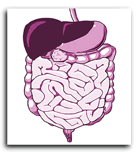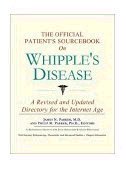|
Whipples DiseaseWhat is it? Do I Have It?
Do you have Whipples disease? Or, do you know someone who suffers from it? Or, are you checking to see if the symptoms you have may be a serious disease? Whatever the reason, you have come to the right place. On this page, as well as many other pages within this site, you will find the information you are looking for in understandable terms, whether you need information pertaining to Whipples Disease, colon cancer, diverticulosis, diverticulitis, spastic colon, irritable bowel syndrome (IBS), twisted colon, Crohns disease, or many other colon diseases or digestive disorders.
THE GOOD NEWS! The good news is that Whipples Disease is treatable. It is a malabsorption illness, which means it interferes with the body's ability to absorb certain nutrients. 
Supplementing your diet with additional nutrients is important. The disease causes weight loss, incomplete breakdown of carbohydrates or fats, and malfunctions of the immune system, and it may affect the heart, lungs, brain, and eyes. When recognized and treated, Whipple's disease can usually be cured. Untreated, the disease may be fatal. Whipples disease is caused by bacteria named Tropheryma whippelii. It can affect any system of the body, but occurs most often in the small intestine. Lesions appear on the wall of the small intestine and thicken the tissue. The villi--tiny, finger-like protrusions from the wall that help absorb nutrients--are damaged.
SYMPTOMS Symptoms of Whipples disease, like many
digestive system disorders
include diarrhea, intestinal bleeding, abdominal pain, loss of appetite, weight loss, fatigue, and weakness. Arthritis and fever often occur several years before intestinal symptoms develop. Patients may experience neurological symptoms as well. Diagnosis is based on symptoms and the results of a biopsy of tissue from the small intestine.
TREATMENT Whipples disease is treated with antibiotics to destroy the bacteria that cause the disease. The physician may use a number of different types, doses, and schedules of antibiotics to find the best treatment. Depending on the seriousness of the disease, treatment may also include fluid and electrolyte replacement. Electrolytes are salts and other substances in body fluid that the heart and brain need to function properly. Extra iron, folate, vitamin D, calcium, and magnesium may also be given to help compensate for the vitamins and minerals the body cannot absorb on its own.
Highly recommended! Click here for more information on the Rx for Life Optimal Health Pack. It's also known as the "Prescription For Life". When you review the research and try it yourself, you'll understand. Look for specific brands of Vitamins other than Rexall.

If you want to learn more about this disease, I recommend a book called: "The Official Patient's Sourcebook on Whipple's Disease: A Revised and Updated Directory for the Internet Age". This book has been created for patients who have decided to make education and research an integral part of the treatment process. Although it also gives information useful to doctors, caregivers and other health professionals, it tells patients where and how to look for information covering virtually all topics related to this disease. DIGESTION HEALTH There are numerous products on the market that are geared towards digestion health. Of course they all make health claims. You really should limit yourself to considering pharmaceutical grade nutritionals. Check out these nutritional products geared towards digestion and
whipples disease.
|
